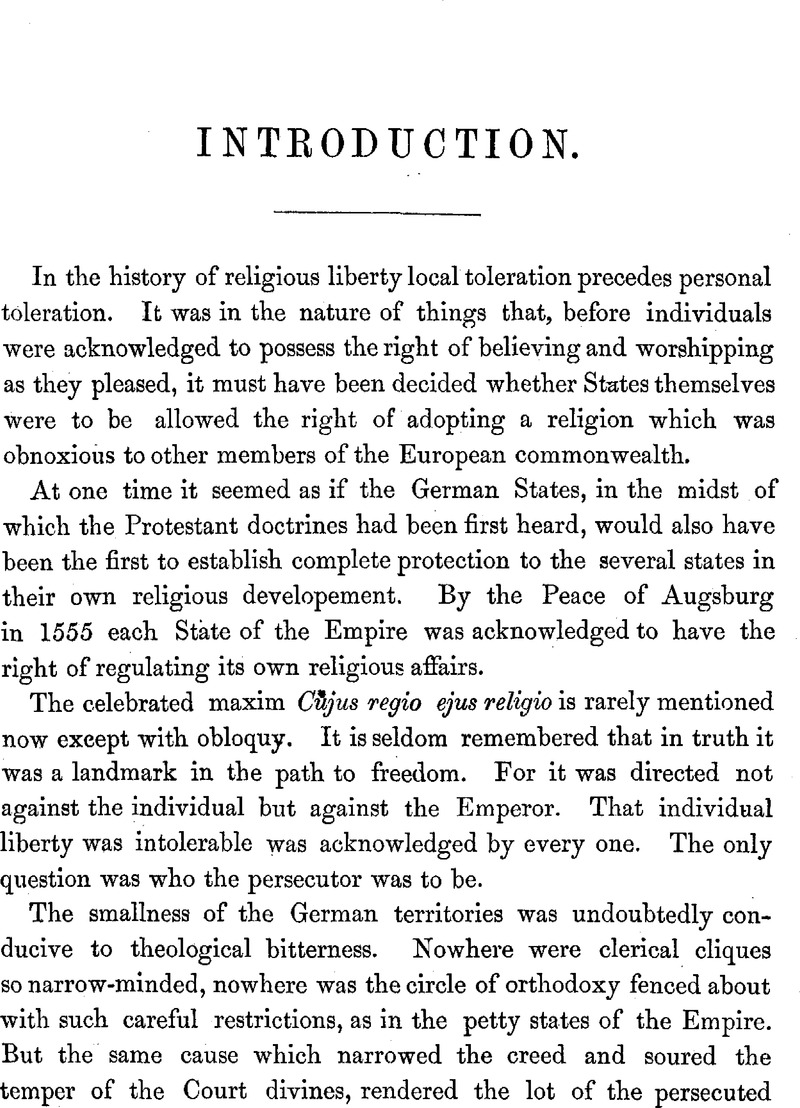No CrossRef data available.
Article contents
Introduction
Published online by Cambridge University Press: 23 February 2010
Abstract

- Type
- Introduction
- Information
- Copyright
- Copyright © Royal Historical Society 1865
References
page xviii note a Die husitischen Kämpfe sind eine nationale Sache gewesen und die Erinnerung an dieselben verwischte sieh nie im Bewusztsein der Nation. Dichter und Maler entlehuten denselben ihren Stoff, einige der trefflichsten Volkslieder datiren aus jenen Zeiten, die Männer jener Bewegung sind stets in Munde des Volke geblieben, und kein Böhmischer Königsname ist je demselben so geläufig geworden als der des blinden Anführers der Husitenheere. Die Husitenzeit bildet den Anknüpfungspunkt an die ältesten aber auch frischesten Traditionen des Volkes und kaum gibt es einen Ort von Bedeutung in Böhmen, über den die Sage nieht ein merkwürdiges Ereignisans jener Zcit zu erzählen wüszte. Die gewaltsame Umwälzung unter Ferdinand II, die vielen Leiden im österreiehischen Suecessionskriege bei den Einfällen der Preuszen, Baiern, und Franzosen sind kaum 100 bis 200 Jahre entfernt, und doeh hȧftet die Erinnerung mit seltener Schwäche an ihnen. In beiden Fällen hat der Landmann nur gelitten, der Gewalt seine Ueberzeugung oder seine Habe zum Opfer gebracht, nie sich zur Wehr gesetzt.— Gindely Geschichte der Ertheilung des Böhmischen, Majestätsbriefea, 116.
page xx note a That the Protestants were not warranted in their appeal to the Charter, seems to be proved conclusively by Professor Gindely. Geschkhte der Böhmischen Brüder, ii. 406 and 507, note 105..
page xxvi note a Londorp, Aota Publica, iii. 596—621.
page xxvii note a The following is the letter which he wrote to Frederick on the subject of the approaching election (State Papers, Germany, ![]() 1618):
1618):
Monsieur Mon Fils,
We do take it as an assured testimony of your love and respect to us that, as before in other things concerning the estate of the Empire you have made us acquainted with your proceeding, so now in this matter of the Electorall Dyett you desire to have our advise for that which shall concerne your selfe or the Empire. What may be the chiefest scope of that assembly is not yet certainlye knowne to us, but as wee have perceaved by former advertisements from your self, and likewise from other places, wee take the end of it to be the eleccion of the King of Bohemia to be King of the Romanes; wherein, for so much as concerneth you and our frends in the Empire, wee are of opinion that the best way to be taken is to avoid any present eleccion, as a matter not being of necessitie during the Emperor's life, and thereby to Wynne time and to discerne further into the scope and proceeding of that familie in this warre of Italie, wherein, perhapps, if a principall partie interessed be elected to such a place as a King of Romanes holdeth, the Empire may be accidentally and unnecessarily engaged. This wee hold the safest and fittest for the present condition of things, if you shall find such .concurrency therein as that it may be effected, and without any speciall offence to yourself alone, if, notwithstanding your endeavours, it cannot be avoided. But, if you shall find theire partye so made as that the eleccion cannot be delayed, but will take place, in the second place our opinion is that, because it is very likely that to settle the Empire by this eleccion in their familye they will not sticke to yeald satisfaccion to those who may hinder it, that in giving your consent you make as good conditions for your self and the Princes of the Union, and for the common cause of religion, as you can; wherein, because the particulars are better knowne to you then to us, wee must referre them to your judgement and discretion and the advise you shall receave from other Princes interessed in the same cause.
page xxxiii note a The actual words used were the subject of controversy between James and his son-in-law in January 1621, and cannot be recovered with any degree of certainty.


